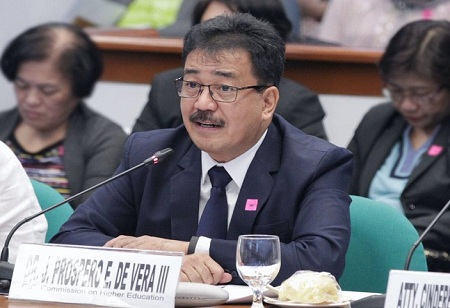-
The Commission on Higher Education (CHED) stated that if the government were to implement a nationwide test to filter the beneficiaries of free college tuition, it must ensure that it is based on equity in the sense that underprivileged and poor students are given priority to qualify for government subsidy. CHED Chairman Prospero de Vera III defended the agency's free college tuition program, claiming that it is not a waste of public funds because it has assisted some of the poorest families in sending their children to colleges and completing their studies. He claimed that proposing a nationwide test gauge similar to how the University of the Philippines administers its admissions test would be "disastrous," as it would give students from wealthy families who can afford review centers and send their children to private institutions a better chance than students from low-income families. De Vera was alluding to Finance Secretary Benjamin Diokno's comments and plan to "filter" individuals eligible for free education through a statewide exam, claiming that the existing free college education program regime is "inefficient and wasteful." "Shouldn't equity be emphasized in higher education?" Because they want everyone to take an entrance exam, and only those who pass will be funded by the government. If the test is anything like the UPCAT (UP College Admission Test), it would be devastating," De Vera told ANC. "Because those who passed the UPCAT are students from relatively wealthy households from metropolitan regions who have the money to do review classes, be prepared, and so on."
De Vera stated that it is the role of CHED to provide education to individuals from low-income households, and that he would only agree to a countrywide qualification test if it emphasizes on "equity," otherwise he is opposed to such plans. The CHED head also refuted Diokno's claims that the program was inefficient because of the increased dropout rate, claiming that the dropout rate could not be linked only to free tuition because many kids had to quit school because to the COVID-19 pandemic and a lack of resources for education day-to-day expenses. "Shouldn't the government, then, help impoverished students with the means to finish their education?" he said. De Vera also encouraged any detractors of the free college tuition scheme to conduct interviews with recipients to see how their lives have altered as a result of government assistance. He mentioned, for example, that CHED is presently studying the "first-generation graduate phenomenon," in which families have finally had a first graduate in their family. "They are students who are the first in their family to attend university." To be a graduate. And I invite the critics to join me for an interview... "Their lives are altering as a result of their education," he remarked.
"At CHED, we are aware of the reduced fiscal space and are making the best use of the limited resources." We're not asking for the moon, or to double the budget for free higher education, but please don't lay it aside because the impact on the country as a whole will be devastating," he added. The Marcos government intends to allocate P105.6 billion to state institutions and colleges under the 2024 National Expenditure Program (SUCs). Specifically, P21.7 billion would be used to pay free tertiary education for around 3.15 million students across the country. The education sector will receive P924.7 billion in funding next year, or 16% of the record P5.768 trillion budget for 2024. In the midst of a proposal to reform the Universal Access to Quality Tertiary Education (UAQTE), the Federation of Free Workers (FFW) requested the government yesterday to award scholarship funds to working students. "We want the government to provide scholarships to working students, including not just free tuition but also book, transportation, and living allowances," stated FFW spokesman Dennis Gutierrez. "Limiting the education budget is not in line with the country's goal of growth, progress, and supporting every person," Gutierrez continued. According to the FFW official, the government's decision to cut education financing will cause severe problems in the country's future. He emphasized that education is still the cornerstone of both individual growth and national success.
In response to Diokno's request for a revision of the UAQTE, FFW vice president Jun Ramirez said he couldn't comprehend how the government's budget is strained by the less-than-1% expenditure in free education. "The affluent go to private institutions or abroad," Ramirez continues, "but we should make free college education a tremendous equalizer, making it available to everyone, regardless of economic standing." He emphasized that the government should guarantee free access to quality education to anybody interested in pursuing higher education, regardless of their socioeconomic status. Notwithstanding the low level of funding for free education, the initiative has been critical in providing free college education to nearly two million students in SUCs, according to the organisation. According to the report, the UAQTE program has been a light of hope for numerous impoverished students, allowing them to pursue higher education and dream of a better future. According to the FFW, "it has greatly lessened the financial strain on families of workers striving to send their children to college." It went on to say that education is an investment in the future of the country, not an expense. The labor organization encouraged Diokno and the Marcos administration to reconsider their attitude and increase funding for the UAQTE program so that no qualified student is left behind to financial constraints.
🍪 Do you like Cookies?
We use cookies to ensure you get the best experience on our website. Read more...

